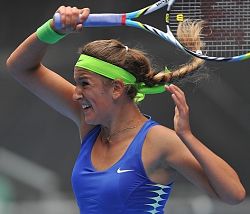Women's Tennis Matches Ruined by Loud Shrieks and Grunts
The crowd's enjoyment of the tennis a the recent Australian Open has been marred by the loud shrieks with every stroke by Maria Sharapova, Ekaterina Makarova and Victoria Azarenka. Many other players grunt and shriek loudly. Such grunts and shrieks seem to get louder and louder, through a match, and have got much louder over the years. Crowds at many matches have complained. They have made mocking sounds mimicking the screams, all to no avail. Many of the fans are considering bringing ear muffs or ear plugs to future matches, or to simply stay away or avoid the screaming matches. Many people watching on their home TVs turn their sound way down to avoid the annoyance which distracts from the enjoyment of watching tennis. The BBC has considered developing a filter device that reduces the high frequency shrieking sounds, while not affecting the other sounds The opponents who have been the victims of the shrieks, have complained, but the Women's Tennis Association (WTA) has done nothing about it and kids learning to play the game follow the example of the premier players. How loud are the grunts and shrieks and are they fair? Should the shrieks be banned and if so how can this be done? Should loud grunting and shrieking be banned?


The first screamer in International Tennis was probably Monica Seles prompting Steffi Graf to complain to the umpire that it was a distraction technique. But apparently nothing was done about it then, nor since. Serena Williams received a penalty when she lost the women’s finals against Australian Sam Stosur, for yelling “Come on!” just as Sam Stosur was about to make a shot. The Shrieks resound for several seconds, long after the ball leaves racket and most until the opponent is about to hit the ball. Surely this is the same thing - distracting an opponent while preparing to make a shot.
Various players have recently complained to the media that Maria Sharapova’s shrieks are annoying and much too loud, but any official complains either on or off the courts seem to be rare. Lots of players now make various grunts but nothing nearly as loud.
How Loud are the Shrieks?
The table below compares the shrieks measured recently at about 90-100 dB. This is right on the threshold of loudness for risking permanent injury for sustained exposure at 90 dB. It is almost as loud as an ambulance or police car siren ( 115 dB), a motorcycle (100 dB) and a jackhammer (110 dB) and a lawn mower (90 dB). These sounds are certainly very loud.
Many commentators have claimed that the loud shrieks are designed to intimidate the opponent by sending a message that the player has hit the ball extremely hard. It is a habit during competitions and games, but is not done all the time and so its not a physical requirement. The players do not shriek during warm-up or practice. This means that the shriekers are doing it intentionally to intimidate, if not distract their opponents, whether they admit to it or not. It is a deliberate tactic.
Some Tennis coaches say shrieking and grunting is simply an exaggerated exhalation of air that follows physical exertion, like the yell made with a karate chop. But why so loud, and why does it vary at different stages of the match. Why is it absent during training and warm-up? It must be very distracting to opponents who are used to the gentle and soft thwack and a whizz sounds of the ball hitting the raquets.
Some commentators allege that grunters and shriekers are blatant cheats because, at the very least, the noise disguises the sound of the ball coming from the strings of the racquet. Players can normally tell how hard the ball is hit and whether it has been hit in the centre of the racket from the sound it makes. The shrieks drown out these sounds.
Grunts grow louder under pressure and during critical points which may be signs of extra exertion, but could also be seen as unfair and distracting.
Conclusion
The action proposed by the WTA to focus on training and coaching to discourage its use is too weak and its unlikely to be successful, when no action is taken during competitive matches. Young payers will follow what they see on TV. It is unlike to work.
Loud grunting and shrieking should be banned and the penalty for shrieking should be the same penalty as for any other unsporting conduct in tennis: WARNING, POINT PENALTY, FORFEIT. Umpires should be provided with loudness meters and players warned when the sounds exceed a certain level they will be penalised. Prolonged shrieks that extend after the shot is made should always be banned. Players should be encouraged to complain to the umpire about these distractions as applies to other things during matches.
What do you Think?
Should Loud Shrieking and Grunts be Banned and Penalised
- 97% Yes
- 3% No
Sound Level Comparisons
|
sound
|
dB
|
|---|---|
|
Tunguska Meteor: a massive explosion in Russia in 1908
|
315
|
|
Blue Whale
|
188
|
|
rocket launch
|
180
|
|
howitzer cannon
|
175
|
|
safety airbag
|
170
|
|
.357 magnum revolver
|
165
|
|
shotgun
|
160
|
|
cap gun
|
155
|
|
gunshots
|
155
|
|
fighter jet launch
|
150
|
|
Fireworks: The Sydney Harbour Bridge on New Year's Eve
|
150
|
|
firecracker
|
145
|
|
jet engine at takeoff
|
140
|
|
Rock concert: Swans
|
140
|
|
Rock concert: Manowar
|
139
|
|
air raid siren
|
135
|
|
peak stadium crowd noise
|
130
|
|
Rock concert: The Who
|
126
|
|
balloon popping
|
125
|
|
thunderclap
|
120
|
|
emergency vehicle siren
|
115
|
|
Tennis Crowd Noise: Australian Open
|
111
|
|
jackhammer
|
110
|
|
sporting event
|
105
|
|
motorcycle (riding)
|
100
|
|
Tennis: Maria Sharapova
|
100
|
|
Tennis: Victoria Azarenka
|
100
|
|
inside subway car
|
95
|
|
lawn mower
|
90
|
|
Sound level risking damage when sustained
|
90
|
|
passing diesel truck
|
85
|
|
alarm clock
|
80
|
|
vacuum cleaner
|
75
|
|
dishwasher
|
70
|
|
conversational speech
|
60
|
|
light traffic
|
50
|
|
babbling brook
|
40
|
|
whisper
|
30
|
|
rustling leaves
|
20
|
|
a pin dropping
|
10
|
|
healthy hearing threshold
|
0
|